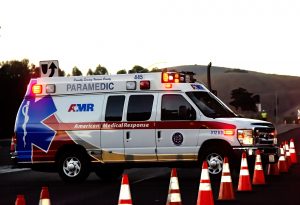Do You Need Medical Attention Immediately After an Accident?
If you’ve just been in an auto accident, one of your first concerns likely is (and should be) whether or not you need immediate medical attention. If you’re at all concerned, you should seek medical help. Shock and the flow of adrenaline that accompanies traumatic events both suppress pain responses, so you might be seriously injured even if you feel clear-headed, painless, and generally fine.
If your accident was a low-speed, simple collision or “fender-bender,” you likely don’t need immediate medical attention, but as there’s a chance you could still have minor injuries, you should still schedule an appointment with a doctor. Many serious injuries are difficult to detect on your own, so never risk it—always seek medical attention shortly after an accident of any scope.
Right After Your Accident
In the moments after your accident, deciding whether or not you need treatment is important, but always err on the side of safety. Even a simple headache, for example, can very realistically be a sign of a traumatic brain injury or internal bleeding. Perform a brief visual examination of your body after the crash and practice self-awareness, taking note of any sensations (or lack thereof) you’re experiencing. Never delay treatment, and never dismiss a symptom as “harmless.” If you experience any of the following after a crash, you should seek medical attention immediately:
 Pain (of any intensity, location, or size, even if it seems minor or dull)
Pain (of any intensity, location, or size, even if it seems minor or dull)- Headaches or confusion
- Numbness or tingling
- Stiffness or any loss of movement
- Bleeding of any kind, even with light scrapes
- Swelling or discolored skin
- Strange scents, sensations, or light sensitivity
Regardless of symptoms, if your accident was moderate to severe/ anything more than a parking lot bump, you should seek immediate medical treatment.
Delayed-Onset Injuries
Even if you were seemingly unharmed at the time of an accident (and even if you saw a doctor), you might have a delayed-onset injury that only sets in after days or weeks. Keep an eye on your symptoms, and if something manifests, don’t assume that a wound will alleviate of its own accord. Whiplash is an especially common auto accident injury, even in low-speed collisions, and often only manifests as neck pain and stiffness after days or even hours have passed.
Auto Accident Compensation in Arizona
Seeking medical treatment doesn’t just preserve your health; it’s a key part of the compensation and settlement process as well. Insurance companies commonly question the veracity of a victim’s injuries, doubting whether they’re as severe as they claim. This is especially true in the case of delayed-onset injuries, as most adjusters will point out the possibility that these seemingly separate injuries were caused by something other than your accident. Receiving medical treatment generates important records that prove and link your injuries to your accident, thus safeguarding your settlement.
The other half of the settlement process is getting the help of an experienced auto accident attorney. By contacting ELG at (623) 877-3600 to schedule a free consultation, you can level the playing field with an affordable professional on your side and receive the compensation you deserve for your bills, losses, pain, suffering, and other damages.







